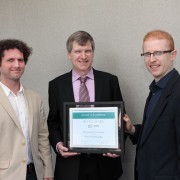The SSG Story so far: Yuill Herbert presents to the All – Party Co-operative Caucus
The All-Party Caucus on Co-operatives held its eight meeting on Wednesday, April 22nd, 2015, under the theme “Innovative co-ops in green technologies and climate change adaptation.” Yuill was invited to provide the story of SSG, and why we do what we do. Here is his presentation:
“Thank you for inviting me here to present- it is an honour. Climate change is literally in the DNA of Sustainability Solutions Group or Groupe de solution durables, the cooperative of which I am a member. To illustrate, I will tell the story of SSG, how from humble beginnings we have become a leading sustainability consulting practice. I believe this story will help demonstrate why Canada needs to invest in more cooperatives as social innovators that confront critical issues facing society.
The genesis of SSG reaches back to my university days. A number of friends and I became concerned about the disconnect between the curriculum and operations and the scientific imperative to act on climate change- our premise being that if universities were not going to act, then who would. We developed the concept of an environmental assessment of a university, which culminated in an extensive analysis of GHG emissions, energy consumption, transportation, and other aspects- completed during late nights after classes. This effort expanded to include social dimensions with almost 30 universities undertaking what we ultimately defined as the Campus Sustainability Assessment Framework.
I graduated, moved back to my parents house and began applying for jobs- with no success. A friend working with a management consulting group suggested that we set up a consultancy based on our experience – one could thus say that we started our cooperative because I was an unemployable philosophy grad. We quickly discovered that there was no market in universities at that time, but decided that regardless a cooperative consultancy focused on sustainability was a meaningful pursuit.
Four of the members had other jobs and decided to use a quarter of their salaries to pay the fifth member- me- to launch the business. There is no better pressure than living off your friends’ money. Shortly afterwards we received a grant from the Cooperative Development Initiative which gave us breathing space to develop financial and governance systems. So I can take this moment to say thank you to the federal government and people of Canada for this support- it was critical.
Through our work with universities we had begun to explore the field of sustainable buildings and one of the members of the coop was working with a remarkable developer in Victoria. Joe van Bellingham was dedicated to transforming the building industry to address climate change and to demonstrate the economic logic of this approach. Working with Joe we became involved in the introduction of LEED, leadership in energy and environmental design to Canada. Our cooperative became one of the first LEED consultants, working on a stream of increasingly high profile buildings, the first LEED platinum mixed-used project in Canada, the first LEED platinum convention centre in the world, the Vancouver Convention Centre, homeless shelters in Vancouver certified to LEED gold and major projects in Calgary, Ottawa and Montreal. We also began working on policy, assessing best practices in sustainable building policy internationally for the Federal Government and developing a high performance building policy for the Government of BC.
At this point we began to consider the role of buildings on the landscape, realising that the location of the building was as important as the design. Saltspring Island issued a Request for Proposals to analyse the implications of land-use planning for GHG emissions for their official plan. We won the project and developed a model that showed by concentrating future development in town centres, the community could save 26% of its greenhouse gas emissions.
This result sparked our interest. By concentrating new dwellings near downtowns, people would walk and cycle more. They would be healthier from the exercise, interact more with positive impacts on mental health, save money on cars and fuel, use transit more and the cost of services for the municipalities would decrease. Because houses and apartments would be in closer proximity, district energy systems would be more feasible as would transit. Saving the climate by making people healthier and happier and saving them money- a convincing equation. The alternative, sprawl, is very difficult to change once constructed- it becomes what we call a stranded investment. Most planning processes in Canada do not meaningfully address these issues.
Our cooperative decided to further develop this model and we have now worked with dozens of towns and cities across Canada to help develop their plans while also employing innovative community engagement strategies. Through modelling and engagement we are able to provide a compelling analysis for a trajectory that can result in 50-80% reductions in greenhouse gas emissions.
Our window into communities provides us with a unique insight to the challenge of climate change. We call climate change a wicked problem because the lateral and rational thinking normally employed by engineers no longer applies in a sphere where uncertainty reigns; uncertainty over rate of change, impacts and costs- it is a potent mix.
In this context, cooperatives are a powerful tool, offering stability, as they tenaciously persist through good times and bad, when other forms of enterprise would leave or close their doors. Unlike investor-owned corporations and the political cycles, cooperatives also have no disincentive against long-term thinking. They are, however challenged by capital. Cooperatives are innovators, but their innovation is not flashy. As I have described, SSG’s sphere of innovation has been primarily in the building industry and urban and community planning. But when you look at the landscape of innovation with respect to climate change, you will find many cooperatives leading their respective industries in car sharing, renewable energy, retail, sustainable construction, finance, agriculture, urban transport and many others.
At the root of this innovation is the ultimate purpose of cooperatives, which first and foremost is to provide meaningful goods and services. Profit is secondary. Without that intent my cooperative, for example, would not have pursued LEED or the modelling work. SSG has been working with the International Cooperative Alliance to consider the role of cooperatives with respect to climate change and we have produced a position paper in the lead up to Paris. We are urging cooperatives in Canada and internationally to join with governments in significantly stepping up their efforts to address climate change, not only to reduce GHG emissions but also to stimulate innovation and to develop a new low carbon economy.”












